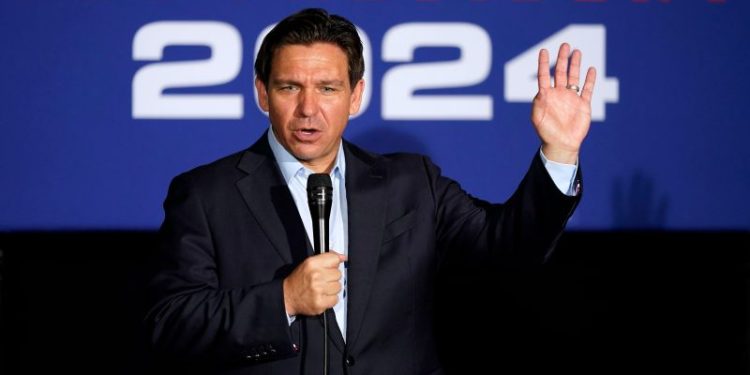“Take the Risk: DeSantis Boldly Confronts Trump, MGMNT Pushes Back!
In a political climate of anger and, at times, hatred, Florida governor Ron DeSantis has taken a more direct approach in chastising Donald Trump, solidifying his stance against the former president and capturing the attention of the political world.
Prior to the events of January 6th, DeSantis had maintained outwardly friendly relations with the former White House incumbent. While DeSantis had often strayed from party lines – most notably in his handling of the COVID-19 pandemic – his criticism of Trump was consistently restrained.
However, after the violent breach of the Capitol, DeSantis – who has long been considered a frontrunner for the GOP 2024 presidential nomination – made it clear that his opinion of Trump had shifted. In the following days, DeSantis implored his Florida constituents to “condemnation the lawlessness and violence we saw”, a far cry from his previous measured rhetoric.
DeSantis’ stance has been met with both backlash and appreciation from the political community. Those closely associated with the populist wing of the Republican party have accused DeSantis of betraying one of the GOP’s most loyal voter-bases. Meanwhile, Republican political strategists have praised the move, believing it to be a shrewd turn, should the governor seek to maintain his leading role within the party.
Overall, DeSantis’ staunch condemnation of Trump represents a severe departure from what had, until recently, been a largely cordial relationship. With much of the Republican party, including Trump himself, firmly entrenched in their beliefs, DeSantis’ verbal departure broadens the split between conservative and populist wings of the GOP. For now, however, the political efficacy of DeSantis’ decision remains to be seen.
In a political climate of anger and, at times, hatred, Florida governor Ron DeSantis has taken a more direct approach in chastising Donald Trump, solidifying his stance against the former president and capturing the attention of the political world.
Prior to the events of January 6th, DeSantis had maintained outwardly friendly relations with the former White House incumbent. While DeSantis had often strayed from party lines – most notably in his handling of the COVID-19 pandemic – his criticism of Trump was consistently restrained.
However, after the violent breach of the Capitol, DeSantis – who has long been considered a frontrunner for the GOP 2024 presidential nomination – made it clear that his opinion of Trump had shifted. In the following days, DeSantis implored his Florida constituents to “condemnation the lawlessness and violence we saw”, a far cry from his previous measured rhetoric.
DeSantis’ stance has been met with both backlash and appreciation from the political community. Those closely associated with the populist wing of the Republican party have accused DeSantis of betraying one of the GOP’s most loyal voter-bases. Meanwhile, Republican political strategists have praised the move, believing it to be a shrewd turn, should the governor seek to maintain his leading role within the party.
Overall, DeSantis’ staunch condemnation of Trump represents a severe departure from what had, until recently, been a largely cordial relationship. With much of the Republican party, including Trump himself, firmly entrenched in their beliefs, DeSantis’ verbal departure broadens the split between conservative and populist wings of the GOP. For now, however, the political efficacy of DeSantis’ decision remains to be seen.










